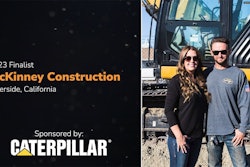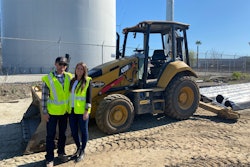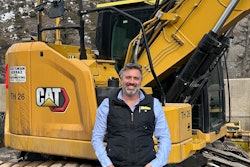Kurk Inc. of Union Grove, Wisconsin, was one of 12 finalists for Equipment World's 2023 Contractor of the Year. The contest recognizes contractors that display the highest standards of business acumen, equipment management expertise, attention to safety, and community involvement.
Each year, 12 finalists receive an expense-paid trip to Las Vegas to participate in roundtable discussions and an awards ceremony.
The company was founded in 1989 by John Kurt. He had started as a landscaper in 1985 and branched out into concrete in 1989.
John's daughter, Amanda Kurt, accepted the award on his behalf.
Visiting McDonald's on the way home from jobsites in her youth may have driven her toward the construction industry. However, it wasn't really on Amanda’s radar to join her dad's business. Amanda Kurt serves as vice president and managing partner of Kurk Inc. and her responsibilities include a lot of different things from commercial bidding, management of the foundation crews, employee engagement, and community outreach.Equipment World
Amanda Kurt serves as vice president and managing partner of Kurk Inc. and her responsibilities include a lot of different things from commercial bidding, management of the foundation crews, employee engagement, and community outreach.Equipment World
"I thought I would go to school, become a structural engineer, and design skyscrapers," she says.
Currently, Amanda serves as vice president and managing partner and her responsibilities include a lot of different things: commercial bidding, management of the foundation crews, employee engagement, and community outreach.
Kurk Inc.'s market area is in Southeast Wisconsin across an eight-county range within about 100 miles of their office.
Amanda says the bread and butter of Kurk Inc.'s $8 million to $10 million business comes from multifamily residential work, with the remainder being commercial or single-family residential.
Currently, Kurk Inc. has five crews: two flatwork crews, two foundation crews, and an earthwork crew. There are also support staff, mechanics, and truck drivers.
She says an average week includes 10 to 15 projects on a sliding time scale, depending on weather and delivery of materials.
“In the construction industry, the poured wall industry, it's kind of make it or break it,” she says. “We have a really great team.”
Trusting in her crews to get the jobs done right the first time, for Amanda, the most important part of the job is developing those relationships.
“Maybe it's your customer relationships, but it's also your mentor relationships, who can you kind of look to when you're having problems, and that can help you grow and get through the challenges,” she says. “I think those relationships are important.”
For her, community means even more than just the 100-square-mile radius they serve. It means the 35 employees of Kurk Inc., its suppliers, the general contractors that hire them, and beyond.
“We really work to provide a successful project from start to finish,” Amanda says. “If that means working with unique situations or trying to kind of find a new solution, we’ll do it.”
From her perspective, even if they’re the concrete contractor, they want everyone to be successful.
“It's just really cool to see our people prosper and our communities prosper because of the work we do,” she says.
Nearly a decade ago, Amanda started buying the business from John in hopes of leading Kurk Inc. to continued success in the future. “We're at a really stable point where we have great crews and great relationships with our customers,” she says.
Ultimately, the goal is for her to continue acquiring the company from John while allowing him to slowly phase out of the business rather than making an abrupt departure. For Amanda, it's a solid succession plan that lets the company continue to prosper even after its founder leaves the business.
 The bread and butter of Kurk Inc. is pouring walls and the flatwork touching it.Equipment World
The bread and butter of Kurk Inc. is pouring walls and the flatwork touching it.Equipment World
Amanda Kurt (00:05):
Most of our projects, we are the concrete subcontractor, we do a little bit of excavation and site utility works, but we are never really a prime contractor. The bread and butter of Kurk Inc. is multi-family residential by a long shot. I would say at least 75% of our business. The other 25% would be residential single family homes. And then there's this mix of commercial, little bit of retail, warehouses, industrial that's just very dependent on location and the type of construction that it is. Our market area is really in southeast Wisconsin. We're probably in a, I don't know, seven or eight county area that's about 100-mile range from our office.
(00:52):
I did grow up in the business. He's been in business since prior to me being born. My plan was never to join the business. Well, I shouldn't say never. It was never on the radar. I thought I would go to school, go become a structural engineer and design skyscrapers. My position currently at Kurk Inc. is vice president and managing partner, and my responsibilities include a lot of different things from most of the commercial bidding, managing the foundation crews, employee engagement, and then just community outreach.
(01:29):
One of our main goals within our company is to recruit into the next generation. And maybe it's not actually impacting our business and bringing new labor to our business, but the construction industry as a whole, some of our initiatives are just outreach with high schools and mentoring students, having apprentices. In Wisconsin, you can have a youth apprentice, so 16 to 18 year olds. And then working with different programs within the school to give the students the opportunity to see what construction is like. And maybe it's a yes and that's a win, but maybe it's a, whoa, I don't want to do that. I want to take another path. And really that's a win too because it helps those students determine what their path looks like. It's hard to tell an 18-year old that working in the mud, is the dream life? But I will say the pay is good, the benefits are good, the work is steady, and you can definitely build your way into a career that's less physical in nature.
(02:38):
Currently, we have five different crews. So we have two flatwork crews, two foundation crews, and an earthwork crew that does site utilities. And then we also have support staff, mechanic, truck drivers, and that kind of support staff. I would say the average week has 10 different projects and sometimes 15. All of our job sites require high vis, and hard hats, and safety glasses, and we provide that to all of them. And I think that's just one step in building the safety culture. So we want it done and we want it done quickly and correctly, but ultimately, we want it to be done safe. We want you to go home at the end of every day exactly how you came. We take a aggressive approach to managing our injuries and return to work to keep our EMR low.
(03:26):
We have a really great team, and included in our team and our community is not just our employees but our suppliers and our contractors that hire us. We really work to provide a successful project from start to finish. And if that means working with unique situations or trying to find a solution, we want everyone to be successful. And I think that's one of our strongest things as a business. It's just a really cool to see our people prosper and also our communities prosper because of the work we do.
(04:04):
I think as concrete contractors, one thing that sets us apart from our competitors is all of our employees have pretty good benefits, including time off and health insurance and retirement. And everyone has the opportunity within our company to grow through the ranks that you can come in as a laborer with no knowledge, gain a lot of knowledge on the job site, and maybe in the future you're what we would call the right hand, second lead guy on the project and into the foreman and superintendent. The opportunity is there. If you want to take that opportunity, it's there. I mean, we have on-the-job training, but we also have, through a lot of our partners, different educational opportunities in safety, in blueprint reading, leadership development that we have at our fingertips and can use. I think the culture of our company is very much to do the work and try to do it the right way. The first place, we don't make excuses why we didn't meet the schedule. And if that means more labor, another piece of equipment, we're there to get the job done and get it correctly.
(05:11):
We have invested pretty heavily in our fleet and some of our equipment to reduce, maybe not labor hours, but reduce labor like wear and tear. So we pump all of our concrete, and in the last 10 years we've purchased a boom pump. We use a laser screen on big flat floors instead of fiber striking, physically having crews do that. So a lot of that technology or investment was worker-related or that was the goal. We'll always take the opportunity to invest in the fleet and maybe that's a newer dump truck, but maybe it's also GPS for our dozer. So I think, in the future, we will be continuing to add to our technology and our fleet.
(06:03):
The future for Kurk Concrete is probably a little complex. We're at a really stable point where we have really great crews, great work line, great relationships with our customers. The ultimate goal is for me to buy more of the company slowly and for my dad to phase out of the company slowly so it's not real abrupt and we can have a solid succession plan and ideally prosper after he leaves the business.











